PUMA recycles football shirts in RE:JERSEY campaign to reduce waste

Manchester City players wore special PUMA jerseys ahead of its clash against Watford on Saturday, which were made using repurposed football jerseys as part of PUMA’s innovative recycling project RE:JERSEY, created by MSL.
RE:JERSEY aims to reduce waste and pave the way towards more circular production models in the future. While PUMA’s football kits on the market today are already made from 100% recycled polyester, the RE:JERSEY shirts are made with 75% repurposed football jerseys. The remaining 25% comes from SEAQUAL ® MARINE PLASTIC[1].
PUMA will also set up special collection bins at the City Store next to the Etihad Stadium to invite fans to donate their old polyester items so they can become a part of this garment-to-garment recycling project. The club will also set up take-back bins in other parts of the Etihad Campus.
“As part of our Forever Better sustainability strategy, we want to take more responsibility when it comes to the end of life of our products,”said Matthias Bäumer, General Manager BU Teamsport at PUMA. “With RE:JERSEY, we are taking an important step in garment-to-garment recycling which will help us reduce waste in the future.”
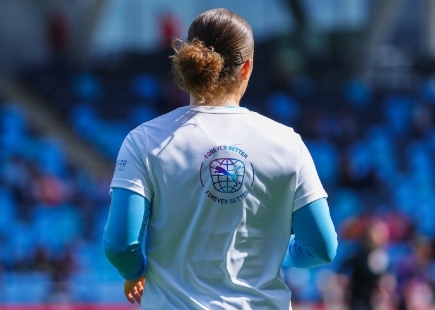
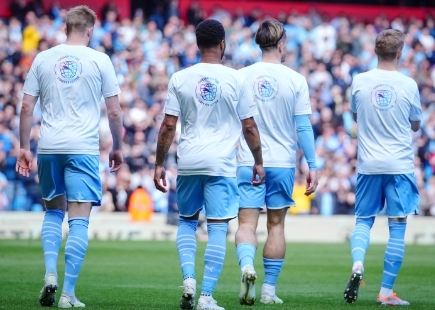

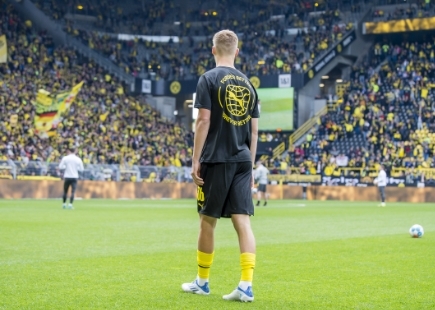
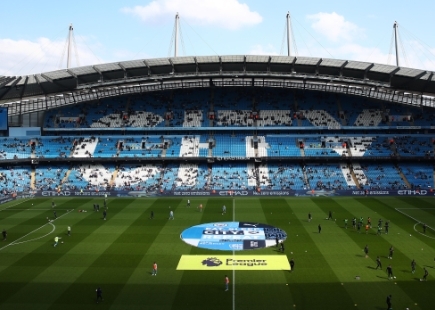
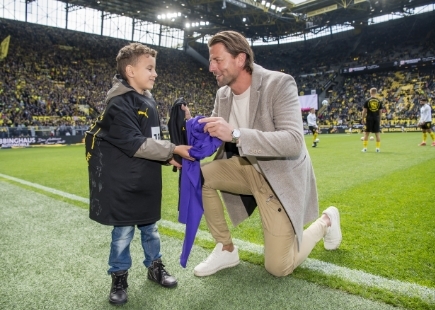
At Saturday’s game, the centre circle at the Etihad Stadium carried the message “Eat, Sleep, City Repeat – 100% RE:JERSEY” on a bright blue patchwork, which was crafted using recycled materials. This patchwork will also be recycled as part of the experiment.
“Both Manchester City and PUMA have made significant commitments to their respective sustainability agendas that ensure both social and environmental actions work for long-term, tangible change,” said Pete Bradshaw, Director of Sustainability at Manchester City. “With RE:JERSEY, PUMA is looking for new ways to make sporting goods more circular and we are proud to be able to play a part in this journey, working to engage fans, community, workforce and partners – actively collaborating for a better future.”
MSL's executive creative director Michael Dowell added, “The patchwork centre circle was the perfect visual metaphor for the RE:JERSEY process—the art of making something new out of something old. We worked with a production team who sewed together 18.5Ms of bold blocks of recycled material that featured some of the most recent Manchester City patterns to bring the impactful design to life. There’s a craft that goes into the process that shows the attention to detail and the importance of the work being displayed. The sheer scale of the design makes it clear for audiences to see what it represents and delivers the RE:JERSEY messaging centre stage for fans to see.”
The products made in the RE:JERSEY project will also make an appearance during the upcoming pre-match warm-ups by Manchester City’s women’s team against Leicester on Sunday, as well as by PUMA Clubs AC Milan, Borussia Dortmund and Olympique de Marseille in April and May.
In the recycling process used for the RE:JERSEY project, even old garments that feature logos, embroideries and club badges can be used, as the material is chemically broken down into its main components (depolymerization). Colours are then filtered out and the material is chemically put back together to create a yarn (repolymerization) that has the same performance characteristics as virgin polyester.
The RE:JERSEY pilot experiment is part of PUMA’s Circular Lab and its Forever Better sustainability platform. As part of Circular Lab, PUMA announced the RE:SUEDE program last year, which tests whether the company can make a biodegradable version of its iconic Suede sneaker.
If you enjoyed this article, you can subscribe for free to our weekly email alert and receive a regular curation of the best creative campaigns by creatives themselves.
Published on:


